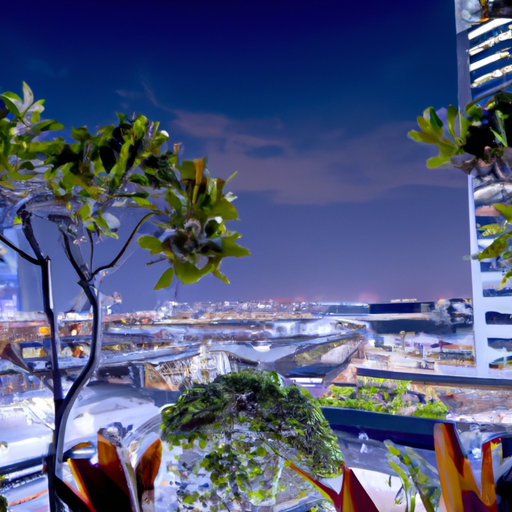
Emerging Trends in APAC Hotel Revenues
Continued growth expected in APAC hotel revenues despite economic pressures
The Asia-Pacific (APAC) region has long been a popular destination for travelers from around the world. With its rich cultural heritage, stunning landscapes, and vibrant cities, it’s no wonder that tourists flock to this part of the world. And as the tourism industry continues to thrive, so does the hotel sector.
Despite economic pressures, APAC hotel revenues are expected to continue their upward trajectory in the coming years. This is due to a combination of factors, including increasing disposable incomes, a growing middle class, and a rise in domestic and international tourism.
One of the key drivers of this growth is the increasing disposable incomes of people in the region. As economies in APAC continue to develop and prosper, more and more people are finding themselves with extra money to spend on travel and accommodation. This has led to a surge in demand for hotel rooms, particularly in popular tourist destinations such as Thailand, Indonesia, and Malaysia.
Another factor contributing to the growth of APAC hotel revenues is the expanding middle class. As more people in the region move up the socioeconomic ladder, they are seeking out new experiences and opportunities for leisure travel. This has created a significant market for mid-range and luxury hotels, which cater to the needs and preferences of this growing demographic.
In addition to the rise in domestic tourism, APAC is also experiencing a boom in international arrivals. The region has become increasingly accessible to travelers from around the world, thanks to improved air connectivity and visa facilitation measures. This has resulted in a surge in foreign visitors, particularly from countries such as China, Japan, and South Korea. These tourists are not only contributing to the growth of APAC hotel revenues but also driving demand for high-end accommodations and luxury experiences.
Despite these positive trends, it’s important to acknowledge the economic pressures that the region is facing. The ongoing trade tensions between the United States and China, as well as the global economic slowdown, have had an impact on APAC economies. However, experts believe that the hotel sector will remain resilient and continue to grow, albeit at a slightly slower pace.
To adapt to the changing landscape, hoteliers in APAC are focusing on innovation and diversification. They are investing in technology to enhance the guest experience, offering personalized services, and exploring new markets and segments. This includes targeting niche markets such as wellness tourism, eco-tourism, and experiential travel.
Furthermore, hoteliers are also looking to tap into the potential of the sharing economy. Platforms such as Airbnb have gained popularity in the region, offering travelers alternative accommodation options. Many hotels are now partnering with these platforms to reach a wider audience and cater to the changing preferences of travelers.
In conclusion, despite economic pressures, APAC hotel revenues are expected to continue their growth in the coming years. The increasing disposable incomes, growing middle class, and rise in domestic and international tourism are driving this growth. While there are challenges to overcome, the hotel sector in APAC remains resilient and adaptable. By embracing innovation, diversification, and collaboration with sharing economy platforms, hoteliers in the region are well-positioned to capitalize on the opportunities that lie ahead. So, whether you’re a traveler looking for a luxurious getaway or a hotelier seeking new business opportunities, the future of APAC hotel revenues looks promising.
Strategies for Sustaining Growth in APAC Hotel Industry

The hotel industry in the Asia-Pacific (APAC) region has been experiencing significant growth in recent years, despite economic pressures. This growth is expected to continue in the coming years, making it an attractive market for hoteliers looking to expand their businesses. In order to sustain this growth, hoteliers in the APAC region need to adopt effective strategies that will help them stay ahead of the competition.
One strategy that hoteliers can employ is to focus on providing exceptional customer service. In a highly competitive market, it is crucial for hotels to differentiate themselves from their competitors. By offering personalized and attentive service to their guests, hotels can create a memorable experience that will keep customers coming back. This can be achieved by training staff to anticipate and meet the needs of guests, and by investing in technology that enhances the guest experience.
Another strategy for sustaining growth in the APAC hotel industry is to target the growing middle class in the region. As disposable incomes rise, more people in the APAC region are able to afford travel and accommodation. Hoteliers can tap into this market by offering affordable yet high-quality accommodations that cater to the needs and preferences of the middle-class traveler. This can include amenities such as free Wi-Fi, complimentary breakfast, and convenient locations.
Furthermore, hoteliers can also consider expanding their presence in secondary and tertiary cities in the APAC region. While major cities like Tokyo, Singapore, and Hong Kong are popular tourist destinations, there is also a growing demand for accommodations in smaller cities. By expanding into these markets, hoteliers can tap into a new customer base and diversify their revenue streams. This can be achieved through partnerships with local developers or by acquiring existing properties in these cities.
In addition to targeting the middle class and expanding into secondary cities, hoteliers in the APAC region should also focus on sustainability. With increasing awareness of environmental issues, travelers are becoming more conscious of their carbon footprint. Hotels that prioritize sustainability and implement eco-friendly practices can attract environmentally conscious travelers. This can include initiatives such as energy-efficient lighting, water conservation measures, and waste reduction programs. By adopting sustainable practices, hotels can not only attract more guests but also reduce operating costs in the long run.
Lastly, hoteliers in the APAC region should leverage technology to enhance their operations and improve efficiency. With the rise of online travel agencies and booking platforms, hotels need to have a strong online presence in order to reach potential customers. This can include having a user-friendly website, utilizing social media platforms, and partnering with online travel agencies. Additionally, hotels can also invest in technology that streamlines operations, such as property management systems and revenue management software. By embracing technology, hotels can improve their overall efficiency and provide a seamless experience for their guests.
In conclusion, the APAC hotel industry is expected to continue its growth despite economic pressures. In order to sustain this growth, hoteliers need to adopt effective strategies that differentiate themselves from the competition. This includes providing exceptional customer service, targeting the growing middle class, expanding into secondary cities, prioritizing sustainability, and leveraging technology. By implementing these strategies, hoteliers in the APAC region can position themselves for continued success in the years to come.
Economic Factors Impacting APAC Hotel Revenues
The Asia-Pacific (APAC) region has long been a popular destination for travelers from around the world. With its rich cultural heritage, stunning landscapes, and vibrant cities, it’s no wonder that tourism in the region has been booming in recent years. However, like any industry, the hotel sector in APAC is not immune to economic pressures.
One of the key economic factors impacting APAC hotel revenues is the global economic slowdown. As major economies such as China and Japan experience a slowdown in growth, this has a ripple effect on the region’s hotel industry. With fewer business travelers and tourists, hotels are facing a decline in occupancy rates and room revenues.
Another economic factor that is impacting APAC hotel revenues is the rising cost of living. As the cost of living increases, people have less disposable income to spend on travel and accommodation. This means that hotels in the region are facing increased competition for a smaller pool of potential guests. In order to attract customers, hotels are having to offer more competitive rates and value-added services.
In addition to the global economic slowdown and rising cost of living, APAC hotels are also facing challenges from the sharing economy. Platforms such as Airbnb have disrupted the traditional hotel industry by offering travelers alternative accommodation options at lower prices. This has led to a decrease in hotel bookings and revenues, as more and more travelers opt for the convenience and affordability of home-sharing platforms.
Despite these economic pressures, the APAC hotel industry is expected to continue its growth trajectory. According to a report by PwC, hotel revenues in the region are projected to grow at a compound annual growth rate of 5.8% from 2019 to 2023. This growth is driven by several factors, including increasing disposable incomes, a growing middle class, and rising tourism numbers.
One of the key drivers of hotel revenue growth in APAC is the rise of domestic tourism. As more people in the region have the means to travel, they are choosing to explore their own countries and neighboring destinations. This has led to an increase in domestic tourism, which in turn boosts hotel occupancy rates and revenues.
Another factor contributing to the growth of APAC hotel revenues is the rise of international tourism. The region has become a popular destination for travelers from around the world, with countries such as Thailand, Japan, and China experiencing record-breaking numbers of international arrivals. This influx of tourists has created a demand for hotel accommodation, driving up occupancy rates and room revenues.
Furthermore, the APAC hotel industry is adapting to the changing landscape by embracing technology and innovation. Hotels are investing in digital marketing strategies, mobile apps, and online booking platforms to attract and retain customers. By leveraging technology, hotels are able to reach a wider audience and provide a seamless and personalized guest experience.
In conclusion, while the APAC hotel industry is facing economic pressures such as the global economic slowdown, rising cost of living, and competition from the sharing economy, it is expected to continue its growth trajectory. Factors such as increasing disposable incomes, a growing middle class, and rising tourism numbers are driving hotel revenue growth in the region. Additionally, the industry is adapting to the changing landscape by embracing technology and innovation. With these factors in play, the future looks bright for APAC hotel revenues.


